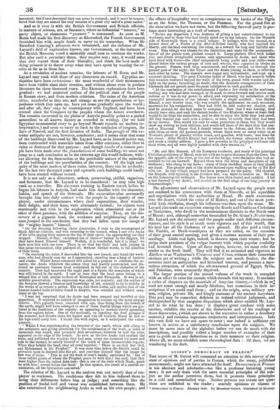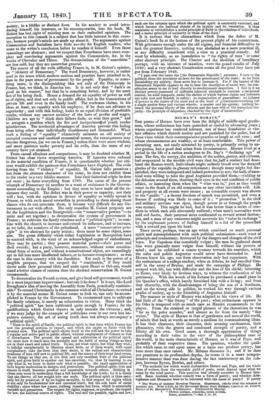GITIZOT'S DEMOCRACY IN FRANCE.*
THE name of M. Gnizot will command an attention to this survey of the state of opinions and of parties in France, which the essay, published anonymously, might not have attracted for itself. Democracy in France is too abstract and scholastic—too like a professor lecturing young men ; it not only deals with the mere essential principles of the sub- ject as the author perceives them, but it presents those principles in a cold and unembodied way. Neither persons nor events nor ques- tions are exhibited to the reader; scarcely opinions or classes of Democracy in France. January 1849. By Monsieur Guizot. Published by Murray. society, in a lifelike or distinct form. In his anxiety to avoid intro- ducing himself, his interests, or his contemporaries, into his book, M. Guizot has lost sight of existing men or their embodied opinions. The exception to this remark is a subject that has little interest in this coun- try, because people's minds are made up about it. The arguments against Communism and Socialism have little novelty for English readers, who come to the writer's conclusion before he reaches it himself. Even those reasonings are abstract ; and we suspect that Frenchmen have more com- plete and convincing arguments against the Communists, &c. in the works of Chevalier and Thiers. The denunciations of the " anarchists " are less cold, but they are somewhat general. The source of all the evils afflicting France is, in M. Guizot's opinion, an " idolatry of Democracy." The word Democracy, however, is rather used in the sense which modern notions and practice have attached to it, than in the pure sense of government by the people. Equality, or some- thing more, is the distinguishing idea not only of the Democrats in France, but, we think, in America too. It is not only that " Jack's as good as his master," but that he is something better, and by the mere fact of his being Jack. Hence a demand for an equality of power as well as of rights, and that not only in public affairs but in the transactions of private life and even in the family itself. The workman claims, in his ideas at least, an equality with his employer, if he does not advance to superiority ; and with this feeling, looks to an equal division of profitable results, without any narrow scrutiny of the laws of profits and wages. Children are apt to " think their fathers fools, so wise they grow," and to arrogate a position which the fire and inexperience/ of youth render mischievous. The territorial advantages of America prevent this feeling from being other than individually troublesome and distasteful. When such a feeling of " equality " extensively animates an old society of occupied resources and confined economical means, the consequences may become dangerous, (as we see in France,) unless there were more wisdom, and more patience under poverty and its evils, than the mass of any country have yet attained. From casual allusions and comparisons, it may be doubted whether M. Guizot has clear views respecting America. If America were reduced to the material condition of France, it is questionable whether her citi- zens would exhibit the patience that Frenchmen have displayed. The evils flowing from the " idolatry " of equality, M. Guizot fully perceives ; but from the abstract character of his essay, he does not exhibit them to the reader in a very lifelike manner. Into their historical origin he does not enter ; he dates everything from 1789. The cause of the present triumph of Democracy be ascribes to a want of resistance in the Govern- ments succeeding to the Empire : but they seem to have made all the re- sistance they could. The defect was in their power or capacity, not their will ; but, with the opinions in favour of equality so widely spread in France, or with such moral cowardice in pretending to them among those classes who do not entertain them, it became very difficult for any Go- vernment to act with effect. The only remedies M. Gnizot proposes are for the Legitimists and the Bourgeoisie—the " conservative powers "—to unite and act together ; to decentralize the system of government in France ; to cultivate the family relations and a " political spirit"; to com- bine with the church to increase and extend its influence, and to increase, as we infer, the numbers of the priesthood. A mere "conservative prin- ciple" is too abstract for party action ; there must be some object, some aim. The great difficulty which either Legitimists or Bourgeoisie have to contend with, is the want of an acknowledged organ of embodiment. They may be parties ; they possess material power—their purse and their swords; but a party, however, numerous, without some constitu- tional form of action, and without a constitutional object, are exceedingly apt to fall into mere disaffected talkers, or to become conspirators ; as was the case in this country with the Jacobites. Yet such is the power of a tangible purpose, that we suspect the " reactionists," if they could throw aside their personal idols and unite upon Henri or Orleans, would stand a better chance of success than the abstract conservatism M. Guizot recommends.
To decentralize the French system, and give local self-government, would be a most important improvement ; but can it be done ? Is it not, like Lord Brougham's idea of moving the Assembly from Paris, practically unattain- able? To extend Christianity is the common wish of all Christians ; to extend it by the material means M. Guizot seems to look to, can only be accom- plished in France by the Government. To recommend men to cultivate the family relations, is merely an exhortation to virtue. Many think the "political spirit" has been cultivated quite enough in France; for the qualifications which Guizot throws in only restrain the virtuous ; and, if we may judge by the example of politicians even in our own less im- pulsive country, the art of seeing truth does not always accompany a " political spirit."
"Next to the spirit of family, the political spirit is that from which France has now the greatest services to expect, and which she ought to foster with the greatest care. The political spirit shows itself in the will and the power to take a regular and active part in public affairs, without employment of violence or risk of disturbance. The greater the spread and cultivation of the political spirit, the more does it teach men the necessity and the habit of seeing things as they are in their exact and naked truth. To see, not what exists, but what they wish; to indulge complacently in illusions about facts, as if facts would, with equal complacency, take the form that they desire, is the radical and characteristic weakness of men still new to political hfe, and the source of their most fatal errors. To see things as they are, is the first and very excellent fruit of the political spirit, and gives birth to another not less excellent, viz. that by learning to see only what is, we learn to desire only what is possible; the exact appreciation of facts begets moderation in designs and pretensions. The political spirit, true and sincere to itself, becomes prudent and reasonable towards others. Nothing in clines men more to moderation than a full knowledge of the truth; for it is rarely that she throws all her weight into one scale. The political spirit is thus natu- rally led by prudence, if by no higher morality, to that respect for rights which is not only its fundamental law and essential merit, but the sole basis of social stability; since where law ceases, nothing remains but force, which is essentially variable and precarious. The respect for rights supposes, or produces, the respect for law, the habitual source of rights. The real and the possible, rights and law, such are the subjects upon which the political spirit is constantly exercised, and which become the habitual objects of its inqmry and its veneration. It thus maintains or reestablishes a moral principle of fixity in the relations of individuals, and a moral principle of authority in those of the state."
It is curious that the abstractions which form the defect of M. Guizot's book lie at the bottom of the present plight of his countrymen. With grievances enough under the old regime, and financial difficulties to task the greatest financier, nothing was abolished as a mere practical ill, or any difficulty considered with a view to a practical remedy. All went by wholesale, as an immolation to " the rights of mau " or some other abstract principle. The Charter and the abolition of hereditary peerage, with an increase of taxation, were the grand results of July 1830; and a very abstract Constitution seems all the good they have yet got from February 1848.
"I pass over the name she [the Democratic Republic] assumes; I tarn to the political ideas she proclaims as laws for the government of the state: so far from diminishing my anxiety, these serve but to increase it. For if the banner of the Democratic Republic appears to me to bear the inscription of social war, its con- stitution seems to me to lead directly to revolutionary despotism. I find in it no distinct powers possessed of sufficient inherent strength to exercise a reciprocal control; no solid ramparts, ender the shelter of which various rights and interests can take root and flourish in safety; no organization of guarantees; no balance of powers in the centre of the state and at the head of government—nothing but a single motive force and various wheels; a master and his agents; nothing be- tween the personal liberty of the citizens and the bare will of the numerical ma- jority: the principle of despotism, checked by the right of insurrection."



























 Previous page
Previous page